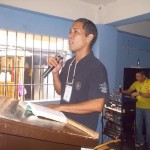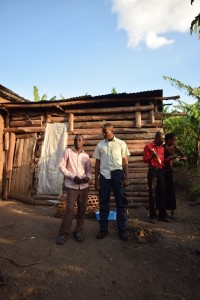Many barriers are broken down when the gospel is preached by a pastor who is recognized by the people. The Holy Spirit can use anyone to be a witness, but consider the strength of using an indigenous pastor starting a church among his own people. White Fields Ministry has been supporting, financially and through prayer, the ministry work of national pastors since 1953. We identify pastors who are ready to work full-time starting a new church in an unreached community of their own country. Through this partnership with the missionaries serving cross-culturally, the laborers are multiplied.

One barrier that is overcome is language. The national pastor has grown up speaking his native tongue. He not only knows the vocabulary and grammar, but he also sounds like the local people. He communicates with the same pronunciation and knows how to select the right word for each situation. This is a great asset when teaching the Bible to new believers. It is easy to learn the standard daily vocabulary of another language, but to gain a spiritual vocabulary is far more complex. Our pastors already know the language and speak it as their mother tongue so they can clearly explain difficult scriptural and spiritual lessons.

Additionally, indigenous pastors look and live like their own people. This goes far deeper than just the physical characteristics of appearance, such as skin color, size, and ethnic distinctions. The pastors have the same cultural background as the people in their communities. This means they know how to shop in the markets, build with the local materials, and live within the constraints of the local landscape. Because of this, the pastors are living examples to their church members. Removed is the confusion over whether this behavior or that behavior is a biblical issue or just a custom from another culture.

New believers see a mature Christian, living and putting spiritual actions into practice in a way they can easily emulate. This method provides a helpful fulfillment of Scripture: “Remember your leaders, those who spoke to you the word of God. Consider the outcome of their way of life, and imitate their faith.” (Hebrews 13:7, ESV) It is easier to imitate someone from their own culture and to put the Word of God into practice in their daily lives.
Our pastors also overcome the barrier of separation caused by living at different economic levels. As I have traveled to visit the ministries of our pastors in the rural and far-reaching villages, I have come to realize that they are in constant contact with the average, typical workers in their communities. They often live right in the corner room of the church building, making them readily available to the commonwealth.

They use all the conventional means of mass transit, including the local pedicab, taxi, and bus. I’ve observed first-hand how this lifestyle allows the pastor and family to have extensive outreach to all socioeconomic strata.
So a pastor that looks like sounds like, and lives like the people he is reaching is “No Stranger” to the people. This provides a strong opportunity for the gospel to be understood and the people in the community will have a living example they can imitate as they seek to follow Jesus.
This method has produced thousands of new churches as indigenous pastors, and their families have labored diligently in their hometowns.

There is one last characteristic of an indigenous pastor that I’d like to highlight. I have often observed an intense commitment to overcome any obstacle. They will live in places with no plumbing, or electricity, or that require strenuous and arduous travel. They will endure hardship and grueling conditions because they have such a serious burden to reach their fellow countrymen.
I am glad we can be partners with these faithful servants of the Lord.